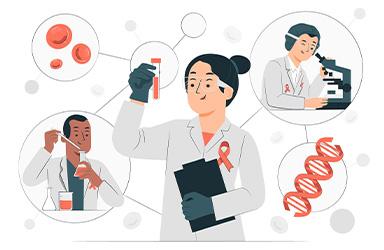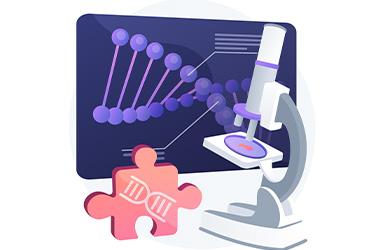
Pharmacogenomics (PGX)
What is Pharmacogenomics (PGX) ?
Utilizes whole exome test customized to meet the specific requirements of doctors. We convert the complex genomic information into clinical insights to help prescribe the right medications.

Offering world’s most trusted comprehensive genomic profiling test with in-depth insights on patients’ clinically relevant biomarkers and genomic alterations matching with FDA approved targeted therapies and immunotherapies.
OncoRx is a Next Generation Sequencing (NGS) based in vitro diagnostic test that uses targeted high throughput hybridization-based capture technology using DNA isolated from Formalin-Fixed Paraffin Embedded (FFPE) tumor tissue specimens and peripheral whole blood extracted circulating DNA.
It screens for Single Nucleotide Polymorphisms (SNPs), Insertion and Deletions (indels), Copy Number Alterations (CNAs) in 351 genes, select gene rearrangements, as well as genomic signatures including Homologous Recombination Repair (HRR) mutations, Microsatellite Instability (MSI) and Tumor Mutational Burden (TMB).
As a trusted partner of choice in companion diagnostics, GenepoweRx helps to advance Personalized Healthcare in India by delivering diagnostic confidence through a broad range of genomic tests. Our standardized, fully-automated and cloud-supported solutions enable rapid turnaround time, empowering physicians to make the right treatment decisions more quickly.
In addition to FDA approved therapies, OncoRx also offers clinically actionable, personalized Pharmacogenomics (PGx) & Nutrigenomics (NGx) report.
PGx report helps in prescribing the right medication by studying the CPIC & PharmGkb approved Biomarkers. NGx profile helps in structuring a personalized nutrition regimen based on an individual’s genetic profile and metabolism.

Treating oncologists can also decide ideal candidates who can benefit from this test by means of immunotherapies, targeted therapies and personalized pharmacogenomic.


What is Pharmacogenomics (PGX) ?
Utilizes whole exome test customized to meet the specific requirements of doctors. We convert the complex genomic information into clinical insights to help prescribe the right medications.

What is GenepoweRx Total ?
GenepoweRx Total is your DNA/genetic testing that can identify your risk for developing a certain disease condition or passing on a genetic disorder. The medical test offers precise treatment plan and a personalized well-being plan.
Address :
Suit#2B Plot No.240,Nirvana, Road No. 36, Jawahar Nagar, Jubilee Hills, Hyderabad, Telangana 500033, India